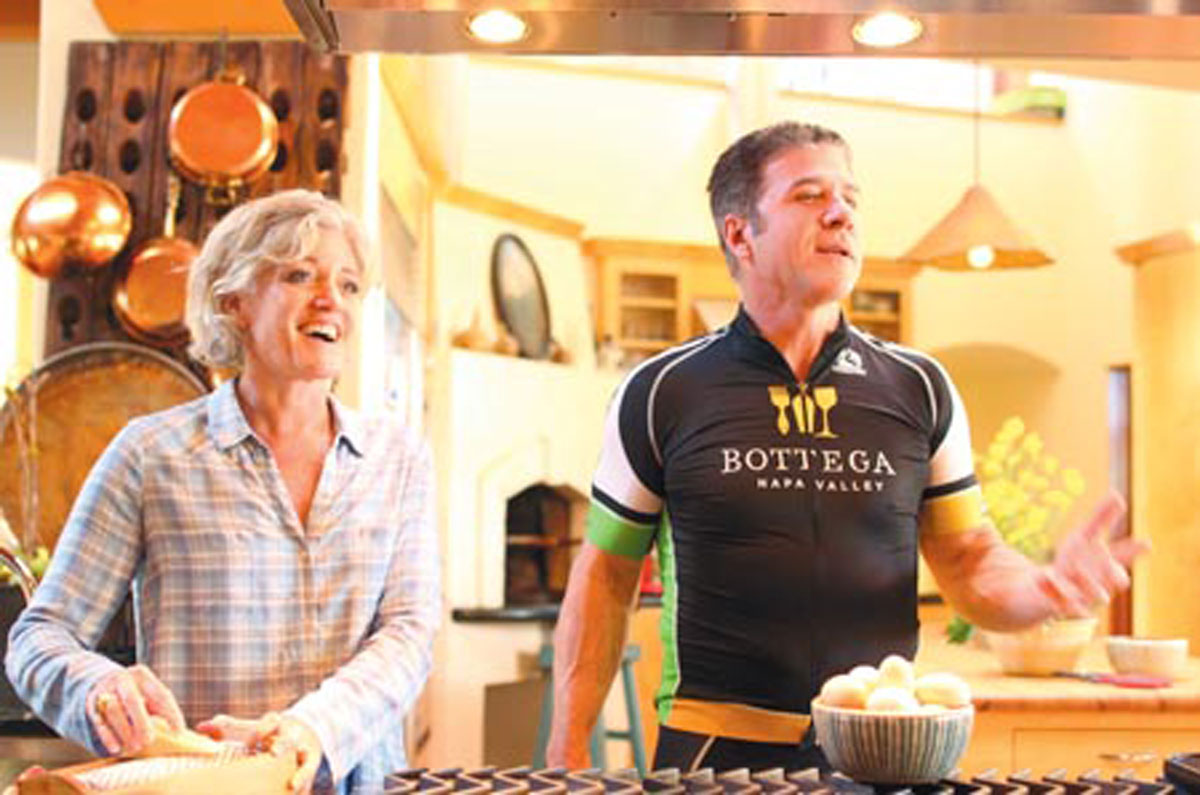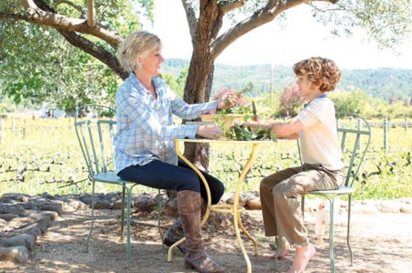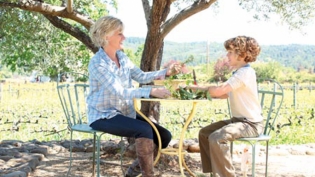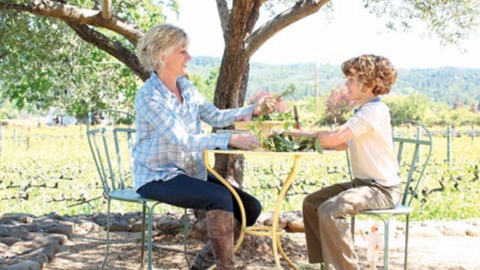Eileen Gordon Chiarello, On a Mission to Raise Barns, Among Other Things
From healthy and artisanal foods to community kitchens, to educational and organic farms and more, Barnraiser is a place to meet the people behind these projects, share their inspirational stories, and fund their success.
—Mission statement of Barnraiser
Eileen Gordon Chiarello is planning to revolutionize the food world, and we may have her grandmother to thank for it. Chiarello, the founder of Barnraiser, a just-launched crowd-sourcing site for food producers, grew up in Falls Church, Virginia, but spent many summers during her youth visiting family in rural Marin and Sonoma counties.
Chiarello’s mother is a Giacomini, the extended family of Swiss-Italian farmers and ranchers who have played a central role in making our Northbay counties the agricultural havens that they are today. Chiarello’s eyes light up and she smiles a wide smile as she remembers childhood stays at her grandparents’ home in California.
“Everything was homemade. I can still remember looking up at my grandmother’s pears set up in the windowsill. They were her backyard pears, lined up, in jars of sugar water.”
She can recall the smells washing over her when she arrived in California: eucalyptus, bay, wild berries.
“I had eight great aunts on my mom’s side who all baked. There were always beautiful pies. I remember sometimes eating pie and ice cream at 10 in the morning!”
Chiarello, who now makes her home in St. Helena, also brims with excitement as she describes Barnraiser, which is, as she sees it, the perfect vocational symphony of her history, talents and passions. Her goal with this new venture, modeled after Kickstarter, the successful online funding platform for creative projects such as films, fashion, art and music, is “to empower the next generation of change makers in the food and farming world as they return America to its more fertile and healthy roots.”
Chiarello graduated from University of Virginia and lived in Georgetown before making her way back to the San Francisco Bay Area on a more permanent basis. Initially, she landed at Apple computers, working in educational technology. It was during this period that she met and married chef Michael Chiarello. Merging their shared passion for food, and myriad talents, the two began to partner in food-related business projects, as well as in their home.
Eileen brought her branding and design skills to their multiple business endeavors, including multiple restaurants; the NapaStyle home and cookware brand; their wine business, Chiarello Family Vineyards; and Easy Entertaining with Michael Chiarello, an Emmy Award–winning show on the Food Network.
While looking for activities for their now 9-year-old son, Chiarello discovered the farm-based educational programs at Connolly Ranch, a 12-acre historic ranch near downtown Napa. At Connolly Ranch, she says she witnessed her son and his classmates come alive in the gardens, opening their hearts to the animals and to the food offerings, showing genuine excitement, as she herself had responded on her relatives’ farms as a young child.
Long discouraged by the dominance and miserable health effects of the large-scale corporate food production system in the United States, and inspired by the potential for today’s young people to create a new path, Chiarello was motivated to take her son’s positive experience at Connolly Ranch even further. She and Michael partnered with Connolly Ranch to develop Dirt to Dine Adventure Camps, now offered during the summers at the ranch. Chiarello’s background in both education and the cooking world came into play as she developed a camp experience that would allow children sensory involvement in sowing, tending, milking, harvesting, prepping, cooking and eating.
“We explore the five major food groups, once each day, taste testing, and using all five senses each day,” says Chiarello. “Every child tries something new. Every child goes through a transformation.”
With Dirt to Dine off and running, inspiring young gardeners and chefs at Connolly Ranch and also at Sunset Elementary in San Francisco, Chiarello got back to thinking.
“I asked myself, What is the bigger picture here?” she says. The big idea that began to take shape in her mind was that while it is absolutely critical to educate and empower the youngest members of society, it would take a pretty radical overhaul of the economic underpinnings of agriculture for things to truly change. She had enough working experience with energetic and worthy young farmers, tirelessly striving to bring sustainably and humanely farmed, pesticide-free food to our markets and tables, to know they need help. The flow of money would have to shift in their direction, and quickly.
“We live in a time of abundance,” says Chiarello. “What we need is hope, generosity, innovation and inspiration.”
Looking to circumvent the traditional methods for garnering investments, which are usually prohibitive for small-scale farmers and producers, she turned to Kickstarter as a model. Since its inception in 2009, Kickstarter has raised over $1 billion in pledges from 5.7 million donors. That is 135,000 projects receiving help in getting off the ground.
The beauty of this direct funding approach, a return to the subscription model of arts patronage, is the simplicity. If a funder believes in the worthiness of a project, they give. The recipient is not required to provide or guarantee anything, although funders often do receive material offerings as well as formal recognition, in addition to the opportunity to witness the success of a project. In the case of Kickstarter, this might be widespread commercial distribution, a MOMA exhibition or an Academy Award, for example. Watching Kickstarter’s results over the past five years brought everything into sharp focus for Chiarello.
“I realized we could funnel hundreds of thousands of dollars into the hands of the food innovators,” says Chiarello. “Barnraiser was born of this.”
She began by assessing the roadblocks to entry in the current food production system. And there are many. Over the past several decades, the average age of American farmers has climbed steadily to 57, and one significant contribution to this demographic shift is the lack of access to affordable land for young people interested in farming. Small-scale meat growers are extremely vulnerable in the face of the monopolized and centralized processing industry. In low-income neighborhoods, would-be producers cannot afford access to commercial kitchens.
These are the barriers, among others, that Chiarello plans to eradicate through Barnraiser. She envisions a future rife with new models: land cooperatives, small local butcheries, shared commercial kitchens.
“From healthy and artisanal foods to community kitchens, to educational and organic farms and more, Barnraiser is a place to meet the people behind these projects, share their inspirational stories, and fund their success,” she says.
Chiarello says that she and the Barnraiser team will serve as “curation partners,” searching out and presenting the most innovative and viable projects. “Over time we will incentivize thousands of projects, but in this first stage, the most important part is finding the very best models to present on the site.”
Taking advantage of modern technology to help folks who are decidedly “back to the roots,” Barnraiser’s website is extremely user-friendly, starting with a homepage that links visitors to “Community Picks,” “Recently Added” and “Local Voices.” Peruse the Local Voices and you will discover, for example, a beekeeper, an urban teacher, an aquaponic farmer and a fermentation specialist, all on the cutting edge of the effort to revolutionize food production. For each project, the potential funder has the opportunity to explore the background of the artisan, activist or farmer, and to hear a detailed description of the project, and their business forecast, including a section on “potential risks and challenges.”
And conversely, for Barnraiser to be successful in its mission, the food producer community must understand and trust the simple beauty of the site, and recognize that a small amount of effort on their part, to present their work in a meaningful way, has the potential to result in the realization of a dream. Funding unhindered by applications, reports and endless paperwork sounds like a Utopian fantasy, as unlikely to most growers and producers as free water.
Amigo Bob Cantisano, nursery owner and heirloom hero of the organic farming community who helped found California Certified Organic Farmers (CCOF) and Pleasant Valley Farm Supply, is a featured Local Voice.
“Amigo Bob kept asking me what the farmers will have to do [to participate on the site], what they will have to provide,” says Chiarello. “It just seemed too good to be true.”
Another dimension of Barnraiser provides what is possibly most essential to cultivating community and creating change. The “Posts” button carries you into the world of stories and opinion—on modernday farming, history, food justice, environmental news and product innovation. Here is the town hall, the classroom and the place for inspiration. Experts like Cantisano, who writes about early Californian horticulturist Felix Gillet, or Lizzie Moore, a farmer and teacher who writes about the Juvenile Redemption Garden at Juvenile Hall, offer the background, links, films and calls to action that encourage the cross-pollinating that will create and sustain the new wave.
“I am just a link,” says Chiarello, waving off acknowledgement of her tireless efforts for the cause. “We can do this! We can put this whole story together. We can get these young farmers up and running, and subsidize the change we need to make happen. We have to. Otherwise agribusiness will continue to rule.”
Indeed, it appears a lot of thanks are due to grandmothers and their home cooking.








